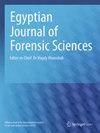牙龄估计六十年研究:文献计量学研究
IF 1.3
Q3 MEDICINE, LEGAL
引用次数: 1
摘要
摘要背景牙龄估计(DAE)研究发展迅速,已成为法医牙科学研究的热点之一。本研究旨在运用文献计量学分析,评估近60年来DAE的研究趋势。方法在Scopus数据库中使用检索字符串(“Dental Age Estimation”或“Age Determination by Teeth”)进行抽样,检测与dae相关的研究。搜索从开始到2022年进行。使用模糊匹配技术进行数据清理干预,以统一作者和隶属关系名称的变化。最初的搜索返回了1638篇文章,出版年份从1964年到2022年,年增长率约为5.9%。来源分析显示,排名靠前的文章来源大部分是Forensic Science International (n = 200)。喀麦隆的整体得分最高(77篇文章,本地h指数为30)。来自上海交通大学的作者发表的论文最多(n = 111)。本地引用最多的研究是Demirjian等人的“A New System of Dental Age Assessment”(Hum Biol 45:211- 227,1973) (n = 1507)。趋势话题分析显示,早期的DAE研究侧重于牙齿退化变化,后来将重点转向利用技术进步。研究机构和作者的合作也具有国际多样性,20.82%的文章是国际合作的产物。结论DAE研究发展迅速,得益于各方面技术的进步。随着对DAE分析的高需求,作者和出版商需要不断地提高他们各自的研究和报告的标准,并继续增加合作。本文章由计算机程序翻译,如有差异,请以英文原文为准。
Sixty years of research in dental age estimation: a bibliometric study
Abstract Background Dental age estimation (DAE) research has grown rapidly and became one of the biggest topics in forensic odontology. This study aimed to evaluate the DAE research trends over the span of 60 years using bibliometric analysis. Methods Sampling was performed in the Scopus database using a search string (“Dental Age Estimation” OR “Age Determination by Teeth”) to detect DAE-related studies. The search was performed from inception to the year 2022. A data-cleaning intervention using a fuzzy-matching technique was done to unify the author and affiliation name variations. Results The initial search returned 1638 articles, years of publication ranging from 1964 to 2022, with an approximate growth rate of 5.9% a year. Source analysis showed that most of the top article sources were Forensic Science International ( n = 200). Cameriere R presents the overall highest score (77 articles, Local h-index 30). Authors from Shanghai Jiao Tong University produced the highest number of publications ( n = 111). The most locally cited study was “ A New System of Dental Age Assessment ” by Demirjian et al. (Hum Biol 45:211-227, 1973) ( n = 1507). The trending topics analysis shows that earlier DAE studies were focused on dental regressive changes and later changed focus to utilizing technological advancements. Institutions and Author's collaborations were also found to be internationally diverse with 20.82% of the articles being a product of international co-authorships. Conclusions DAE research has grown rapidly helped by multiple advancements in various technological ends. Along with the high demand for DAE analysis, authors and publishers need to continually improve their standards for their respective research and reporting and continue to increase collaboration.
求助全文
通过发布文献求助,成功后即可免费获取论文全文。
去求助
来源期刊

Egyptian journal of forensic sciences
MEDICINE, LEGAL-
CiteScore
2.00
自引率
0.00%
发文量
51
审稿时长
17 weeks
期刊介绍:
Egyptian Journal of Forensic Sciences, the official publication of The International Association of Law and Forensic Sciences (IALFS), is an open access journal that publishes articles in the forensic sciences, pathology and clinical forensic medicine and its related specialities. The journal carries classic reviews, case studies, original research, hypotheses and learning points, offering critical analysis and scientific appraisal.
 求助内容:
求助内容: 应助结果提醒方式:
应助结果提醒方式:


